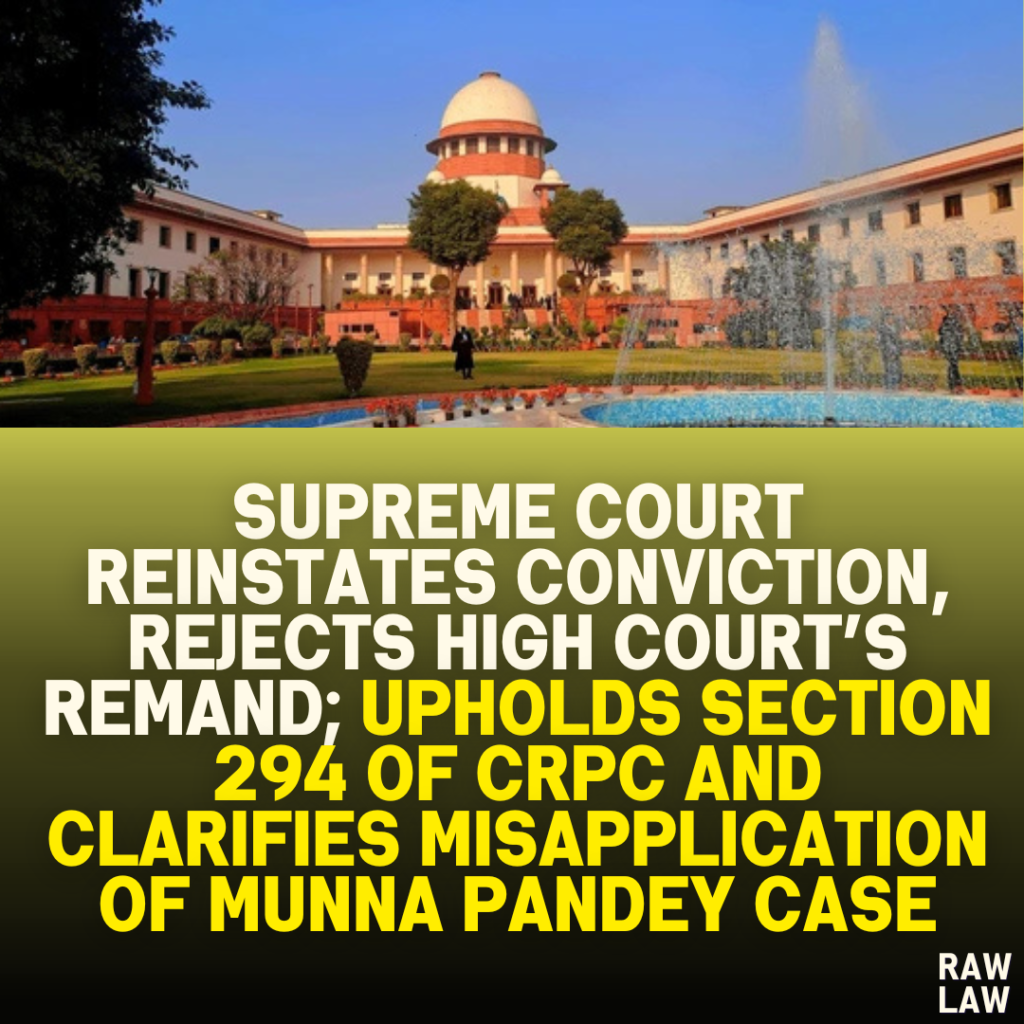Court’s Decision: The Supreme Court reversed the Allahabad High Court’s order of remanding the case back to the trial court for further cross-examination. The apex court restored the original conviction handed down by the trial court, stating that the High Court erred in remanding the case, particularly in its misinterpretation of Section 294 of the Code of Criminal Procedure (CrPC). The Court directed that the High Court reconsider the criminal appeals based on the evidence already presented, emphasizing that the case should proceed on merits without further cross-examinations.
Facts: The case arose from a First Information Report (FIR) lodged in 1998, in which the appellant alleged that on the night of April 21/22, his parents were brutally assaulted and murdered by the accused. The victims’ bodies were later recovered from a well. Forensic reports confirmed that one of the weapons used belonged to one of the accused. The trial concluded with the conviction of the accused for murder and other related offenses under the Indian Penal Code (IPC) and the SC/ST Act. The defense counsel admitted the genuineness of the prosecution documents during the trial, dispensing with their formal proof.
Issues: The main issue before the Supreme Court was whether the High Court was correct in remanding the case back to the trial court for further cross-examination of witnesses, especially in light of Section 294 CrPC, which allows the admission of certain documents without formal proof if their genuineness is admitted by the opposing party.
Petitioner’s Arguments: The petitioner argued that the High Court had erred in its judgment by ordering a remand, stating that the defense had admitted the authenticity of the prosecution documents. The petitioner emphasized that Section 294 CrPC was properly applied by the trial court and that the High Court’s interpretation would render the provision redundant.
Respondent’s Arguments: The respondents, representing the accused, supported the High Court’s decision, arguing that a remand was necessary for a fair trial. They emphasized that the lack of cross-examination of key witnesses, particularly regarding formal documents, warranted further trial proceedings to ensure justice.
Analysis of the Law: The Supreme Court analyzed Section 294 CrPC, which permits documents to be admitted as evidence without formal proof if the opposing party does not dispute their authenticity. It was noted that the trial court had acted correctly by relying on this provision when it accepted the defense counsel’s admission of the prosecution documents.
Precedent Analysis: The Court referred to earlier judgments, such as Sonu alias Amar v. State of Haryana and Shamsher Singh Verma v. State of Haryana, which upheld the application of Section 294 CrPC, emphasizing that documents admitted without dispute could be read as evidence without further formal proof.
Court’s Reasoning: The Court reasoned that the High Court’s remand was unnecessary, as the defense had already admitted the genuineness of the documents in question. The apex court noted that the High Court’s reliance on the Munna Pandey case was misplaced, as that case dealt with the issue of fair trial in the context of unexamined contradictions under Section 161 CrPC, not Section 294.
Conclusion: The Supreme Court set aside the High Court’s remand order, directing the High Court to reconsider the appeals based on the existing trial record. The Court reinstated the trial court’s conviction of the accused and urged the High Court to expedite the appeals process.
Implications: This decision reinforces the application of Section 294 CrPC, clarifying that once the defense admits the genuineness of documents, they can be accepted as evidence without further formal proof. It also underscores the Court’s commitment to preventing unnecessary delays in the judicial process, particularly in long-pending cases. The ruling will likely serve as a significant precedent for future cases involving the admission of undisputed documents in trials.



